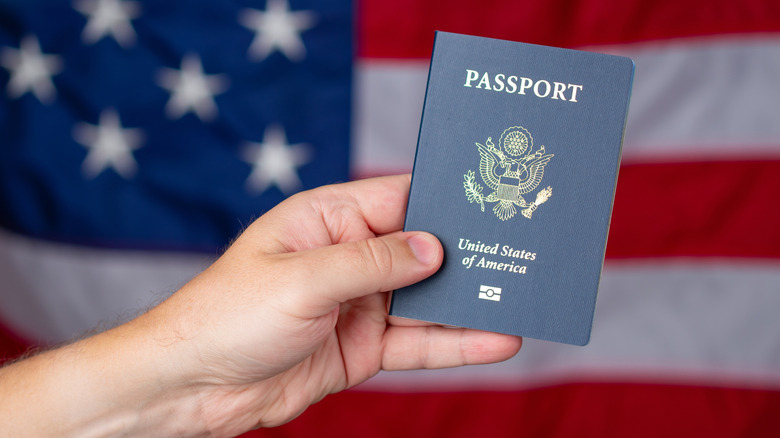Here's What Happens When Someone's Citizenship Is Revoked In The United States
It happens every time a U.S. president comes into power: A) Threats to leave America and renounce one's citizenship, followed by a chorus of, "Well do it, then," or, B) Scary talk of some dictatorial regime rounding up undesirable citizens, revoking citizenship, and tossing them in a gulag. Regarding the first scenario: It's true that since 2013, approximately 3,000 to 6,000 U.S. citizens living abroad per year have renounced their citizenship (singer Tina Turner did it in 2013). As for the latter scenario, it's never happened, though President Donald Trump has expressed his desire to end birthright citizenship, and many have sounded the alarm on the potential implications.
But the U.S. government has stripped people of citizenship based on extreme circumstances and crimes — fewer than 150 since 1968, according to a 2018 Smithsonian report. The Immigrant Legal Resource Center outlines causes that could lead to denaturalization. Examples include lying during the naturalization process or (very specifically) refusing to testify before Congress regarding "subversive activities" within 10 years of being naturalized. But note that those cases refer to citizenship that was earned, not granted by birth. Natural-born citizenship is all but impossible to take away.
So if someone gets citizenship revoked while in the U.S., do some enforcers grab you, haul you off to the nearest border, and chuck you over? Or if you're outside of the U.S., does somebody clap you on the back and say, "Good luck"? Not quite. The cause of the revocation, like crime vs. voluntary renunciation, determines what happens following the reversal. That being said, some things remain the same. You might, for instance, still have to pay taxes.
Ways to have U.S. citizenship revoked
To answer the question of what happens when someone's U.S. citizenship is revoked, we must look to both the ways it can be rescinded and what happens afterward. Looking at the routes to revocation, we've got two paths: voluntary and involuntary. Voluntary revocation means willingly giving up citizenship. This happens by physically going to a U.S. embassy while outside of the country or the Department of Homeland Security while inside it and undergoing a formal "oath of renunciation." Involuntary revocation means the U.S. government takes citizenship away, and the circumstances vary depending on the reason for the revocation and if you're outside of the country or not.
In the case of a voluntary oath of renunciation, the process seems similar across U.S. embassies, with minor variations. The embassy in Moldova says you just have to show up, sign the oath of renunciation, and fork over $2,350. The embassy in the Netherlands says you've got to be 18 years old, not be developmentally or intellectually disabled, be able to read or speak English, have proof of citizenship, etc. They give you a Certificate of Loss of Nationality (CLN), and you apparently just walk out the door.
In the case of involuntary revocation of citizenship, we have limited information. If you're in prison and your citizenship is revoked for a crime like treason, it's safe to say that you'd stay in prison and maybe someone would show up to tell you what happened. If you're wandering abroad and join a foreign military hostile to the United States, no one's going to be present to tell you that your citizenship is revoked (unless you go to a U.S. embassy or fly back to a U.S. airport).
What happens after citizenship is revoked
If someone goes through the very serious step of renouncing U.S. citizenship or has it revoked involuntarily, that person will have to deal with the consequences for the rest of their life. None are pleasant, particularly becoming stateless. Unless a person who loses citizenship is also a foreign national, that person would have no national rights and protections anywhere. This can cascade into problems with passports and IDs, which extends to problems with health insurance, buying or renting property, getting married, having an equally stateless child if you have a kid, and basically every other component of life.
Then there are the financial and legal problems. Someone who loses citizenship is still obligated to pay taxes in the U.S., much like how those who live abroad are required to do so. The non-citizen is also still beholden to financial obligations incurred while a citizen, like child support and loans. And if someone committed a crime in the U.S. and is facing prosecution, that case is going to move forward, citizen or not. As the U.S. Department of State terrifyingly shouts in all caps: "NO ESCAPE FROM PROSECUTION or FINANCIAL OBLIGATIONS."
And finally, there are the travel problems. Someone who lost citizenship might need a (deniable) visa to enter the U.S., even just to see family or friends. Plus, the Department of Homeland Security can straight-up bar someone from entering the country if they determine that a person revoked citizenship to try and avoid paying taxes (which, as we said, isn't possible). In other words: Revoked citizenship or not, a person never really loses connection to the U.S.


